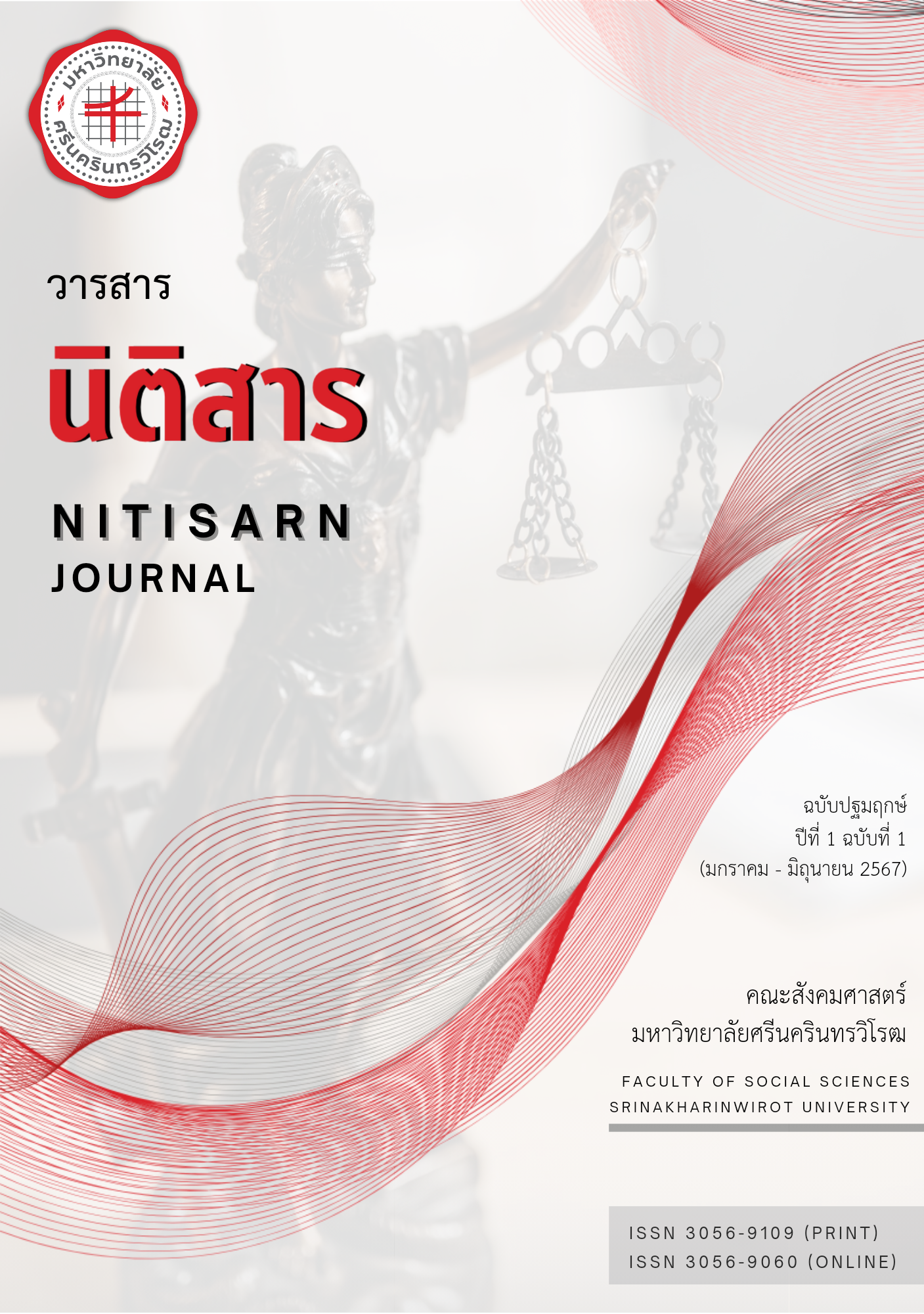ข้อพิจารณาการความรับผิดทางอาญามาตรา 289 (1) กรณีผู้รับบุตรบุญธรรมและผู้ที่เลี้ยงดูมา
Consideration of Liability under Criminal Code Section 289 (1) in Cases of Legitimate Child Adopters and Custodians
Keywords:
มาตรา 289 ผู้รับบุตรบุญธรรม ผู้ที่เลี้ยงดูมา ความรับผิดทางอาญา, Article 289, Adoptive parents, Custodians, Criminal offensesAbstract
กฎหมายอาญาในประเทศไทยมีขึ้นเนื่องด้วยเหตุผลหลากหลายประการ รวมถึงการคุ้มครองสังคมให้บุคคลในสังคมได้อยู่ร่วมกันอย่างสงบสุขมีระเบียบและคงไว้ซึ่งศีลธรรมอันดี โดยเจตนารมณ์ของกฎหมายอาญานั้น ประกอบไปด้วย บัญญัติการกระทำที่เป็นความผิด บัญญัติโทษของการกระทำนั้น และคุณธรรมทางกฎหมายที่แฝงอยู่ในทุก ๆ ความผิดฐานต่าง ๆ ของกฎหมายอาญา กล่าวถึงคำว่า “คุณธรรมทางกฎหมาย คือ ประโยชน์ที่กฎหมายมุ่งที่จะคุ้มครอง” หมายความถึงประโยชน์หรือคุณค่าของการอยู่ร่วมกันในสังคมที่กฎหมายมุ่งที่จะคุ้มครองไว้ หากขาดคุณธรรมทางกฎหมายไป สังคมก็จะไม่เป็นสังคมที่สงบสุข และหนึ่งในคุณธรรมทางกฎหมายที่สำคัญและใกล้ตัวที่สุดคือ คุณธรรมทางกฎหมายของความผิดเกี่ยวกับชีวิตและร่างกายในลักษณะที่ 10 ของประมวลกฎหมายอาญา ดังปรากฎตามมาตรา 289 “ผู้ใด ฆ่าบุพการี...ต้องระวางโทษประหารชีวิต” นั้น ได้บัญญัติคุณธรรมทางกฎหมายในการคุ้มครองศีลธรรมทางศาสนาของพุทธศาสนา และค่านิยมของประชาชนในประเทศไทย ที่มองว่าบุพการีนั้นถือเป็นบุคคลที่มีพระคุณอย่างยิ่ง การฆ่าบุพการีนั้นถือเป็น อนันตริยกรรม หรือกรรมที่หนักสุดในข้อปิตุฆาตหรือมารุฆาต ซึ่งขัดต่อศีลธรรมอันดีของประชาชน กฎหมายจึงให้ความคุ้มครองบุพการีมากกว่าบุคคลทั่วไป สังเกตได้จากโทษของมาตรา 289 ที่กำหนดความผิดมากกว่ามาตรา 288 อย่างไรก็ตาม กลุ่มบุคคลที่ในสังคมถือได้ว่าเป็นผู้มีพระคุณไม่แพ้บุพการี ก็คือ ผู้รับบุตรบุญธรรม หรือบิดามารดาบุญธรรม และผู้ที่เลี้ยงดูมานั้นเอง บทความวิชาการฉบับนี้จึงมุ่งวิเคราะห์ถึงการคุ้มครองทางกฎหมาย วิธีการให้ความคุ้มครองที่มากกว่าบุคคลทั่วไป คุณธรรมทางกฎหมาย และเหตุผลที่กฎหมายอาญามาตรา 289 ควรจะบัญญัติให้รวมไปถึง บิดามารดาบุญธรรม และผู้ที่เลี้ยงดูมาด้วย Abstract Criminal law in Thailand is established for various reasons, including the protection of societal harmony, ensuring individuals coexist peacefully with a set of ethical standards. The essence of criminal law comprises the prohibition of wrongful acts, the penalties associated with those acts, and the legal principles embedded in every offense under criminal law. The term "legal morality" refers to the benefit or value of coexisting in a society that the law seeks to protect. Without legal morality, society cannot achieve tranquility. One crucial legal moral principle is the protection of life and body, as evident in Article 289 of the Criminal Code, which states, "Whoever causes the death...shall be liable to the death penalty." This provision establishes a legal moral standard to protect Buddhist religious values and public sentiment in Thailand, considering a person who has been killed as someone deserving special consideration.However, individuals in society considered to be equally deserving of respect as a person killed are the adoptive parents and caregivers. This academic paper aims to analyze the legal protection afforded, going beyond that given to the general population. Legal morality and the reasons why Criminal Code Section 289 should encompass adoptive parents and caregivers are discussed.Downloads
Published
2024-06-20
How to Cite
Rattasapa Chureemas ร. จ., & Kittin Sansadee ก. แ. (2024). ข้อพิจารณาการความรับผิดทางอาญามาตรา 289 (1) กรณีผู้รับบุตรบุญธรรมและผู้ที่เลี้ยงดูมา: Consideration of Liability under Criminal Code Section 289 (1) in Cases of Legitimate Child Adopters and Custodians. วารสารนิติสาร คณะสังคมศาสตร์ มหาวิทยาลัยศรีนครินทรวิโรฒ, 1(1), 66–85. Retrieved from https://ejournals.swu.ac.th/index.php/ll/article/view/15951
Issue
Section
Articles


